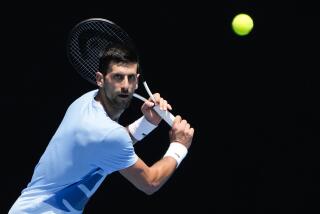Started a Boom : Fibak, Polish Tennis Star, Is Truly a Rarity
- Share via
GREENWICH, Conn. — Rarities are a prevalent part of Wojtek Fibak’s life.
As a youth, Fibak became the first recognized professional athlete from his native country of Poland.
Twelve years later, Fibak is a self-proclaimed rarity because of his staying power on the professional tennis tour. He recalls the early 1970s, when he defeated such tennis legends as Rod Laver, Ken Rosewall and John Newcombe. And now, he is still on the tour, defeating such future stars as Aaron Krickstein and Stefen Edberg.
Fibak himself is a rarity because he is unlike any other tennis professional. When he speaks of tennis, the sport that opened doors for him that he never thought existed, he speaks about love and respect.
He remembers the days he used to spend hitting an old tennis ball against a tattered wall in his hometown of Poznan, Poland, to practice his tennis.
Fibak is unique to the game because he started a national tennis boom in Poland. Because he was not only the first professional tennis star from his country but also the first professional athlete to achieve acclaim, tennis courts began popping up all over Poland.
“In Poland, it was very rare,” Fibak said of his athletic career. “In 1975, I was the first recognized professional athlete in Poland. When I was coming back to Poland, I saw that I created a boom for tennis.”
Fibak is well aware that tennis created a boom for him, too. It enabled him to come to the United States, start a family, and build a house around them. He is now involved in real estate and other business ventures.
“Tennis opened up many doors for me,” he said. “I definitely have a different approach and outlook on the game. Tennis gave me everything in life.”
As a tennis professional, Fibak was never atop the world in singles. But, at the same time, he has been among the top 25 players in the world for over 10 years. His highest ranking was seventh in 1976 and 1977.
Though he never cracked the top three in singles, Fibak teamed with Tom Okker as one of the top doubles teams in the world in the 1970s. He is currently looking for a new doubles partner because Sandy Mayer, his most recent one, has retired.
“If you look at the time gap,” Fibak said, spreading his arms far apart, “I have won matches from Rosewall to Krickstein. That is one of my biggest accomplishments in my career.”
The most intriguing part of Fibak’s game is that he has no forte. No one strength that sets him apart from others. He has never been noted for his blazing serve, his rocket forehand or his lethal backhand. He has a true all-around game. His technique has not died out with the advancement of the game and the younger generation.
“I don’t know of anyone who has maximized his potential in sports the way Wojtek has,” said Roger Pearson, a close friend of Fibak. “He is probably the most intelligent sports person.”
“My technique didn’t grow old,” Fibak said. “It’s not outdated. It’s still good enough to challenge (John) McEnroe. I recently played a match against him on supreme, his best surface, where he’s been killing everyone, and I played even with him all the way.”
Pearson believes that, had it not been for Fibak’s success in doubles, he might have been a better singles player.
Now, although his singles ranking has slipped into the 70s, Fibak remains on the circuit. He is involved in numerous other ventures as well. He spends much of his time studying his Polish art collection and working making real estate investments.
Fibak is also involved with a program called Tennis Canada, which promotes youth tennis in Canada.
“This is something that I picked up as a challenge because Canada is a great country, and for some reason, they don’t produce great tennis players,” he said. “When they asked me, they had John Newcombe and Arthur Ashe looking into this as well.
“I agreed, so I became a consultant through the national tennis program. They would like to look five years down the road and see that they can produce some stars.”
One star Fibak was instrumental in helping produce was Ivan Lendl. He and his wife had been working with Lendl since 1980. Fibak was Lendl’s tennis adviser and helped him become acclimated to the United States. Though they are no longer involved in tennis together, the two remain close friends.
“I told Ivan that I thought the five years was good and that we achieved a lot together,” Fibak said. “We achieved a lot in tennis and a lot in business and our friendship was at a peak. There really isn’t much more we can do in tennis. We went together from being 60 in the world to number three.
“By now, Ivan has learned most of the things around here and has ideas of his own. He’s established himself in the United States.”
Now that Fibak has established himself in the United States, as can be detected be his busy work and social routine, and has helped others to establish themselves, it is apparent that he has not forgotten the people who helped him achieve his success and reach goals he never dreamed reachable.
That, in this day and age, is truly a rarity.
More to Read
Go beyond the scoreboard
Get the latest on L.A.'s teams in the daily Sports Report newsletter.
You may occasionally receive promotional content from the Los Angeles Times.










